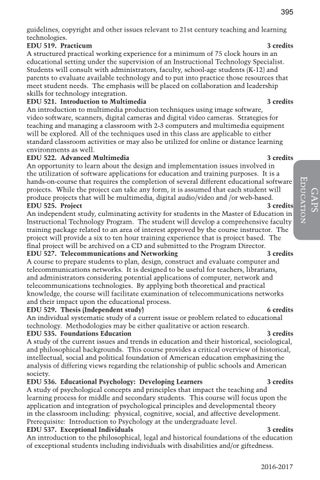395
2016-2017
GAPS Education
guidelines, copyright and other issues relevant to 21st century teaching and learning technologies. EDU 519. Practicum 3 credits A structured practical working experience for a minimum of 75 clock hours in an educational setting under the supervision of an Instructional Technology Specialist. Students will consult with administrators, faculty, school-age students (K-12) and parents to evaluate available technology and to put into practice those resources that meet student needs. The emphasis will be placed on collaboration and leadership skills for technology integration. EDU 521. Introduction to Multimedia 3 credits An introduction to multimedia production techniques using image software, video software, scanners, digital cameras and digital video cameras. Strategies for teaching and managing a classroom with 2-3 computers and multimedia equipment will be explored. All of the techniques used in this class are applicable to either standard classroom activities or may also be utilized for online or distance learning environments as well. EDU 522. Advanced Multimedia 3 credits An opportunity to learn about the design and implementation issues involved in the utilization of software applications for education and training purposes. It is a hands-on-course that requires the completion of several different educational software projects. While the project can take any form, it is assumed that each student will produce projects that will be multimedia, digital audio/video and /or web-based. EDU 525. Project 3 credits An independent study, culminating activity for students in the Master of Education in Instructional Technology Program. The student will develop a comprehensive faculty training package related to an area of interest approved by the course instructor. The project will provide a six to ten hour training experience that is project based. The final project will be archived on a CD and submitted to the Program Director. EDU 527. Telecommunications and Networking 3 credits A course to prepare students to plan, design, construct and evaluate computer and telecommunications networks. It is designed to be useful for teachers, librarians, and administrators considering potential applications of computer, network and telecommunications technologies. By applying both theoretical and practical knowledge, the course will facilitate examination of telecommunications networks and their impact upon the educational process. EDU 529. Thesis (Independent study) 6 credits An individual systematic study of a current issue or problem related to educational technology. Methodologies may be either qualitative or action research. EDU 535. Foundations Education 3 credits A study of the current issues and trends in education and their historical, sociological, and philosophical backgrounds. This course provides a critical overview of historical, intellectual, social and political foundation of American education emphasizing the analysis of differing views regarding the relationship of public schools and American society. EDU 536. Educational Psychology: Developing Learners 3 credits A study of psychological concepts and principles that impact the teaching and learning process for middle and secondary students. This course will focus upon the application and integration of psychological principles and developmental theory in the classroom including: physical, cognitive, social, and affective development. Prerequisite: Introduction to Psychology at the undergraduate level. EDU 537. Exceptional Individuals 3 credits An introduction to the philosophical, legal and historical foundations of the education of exceptional students including individuals with disabilities and/or giftedness.
